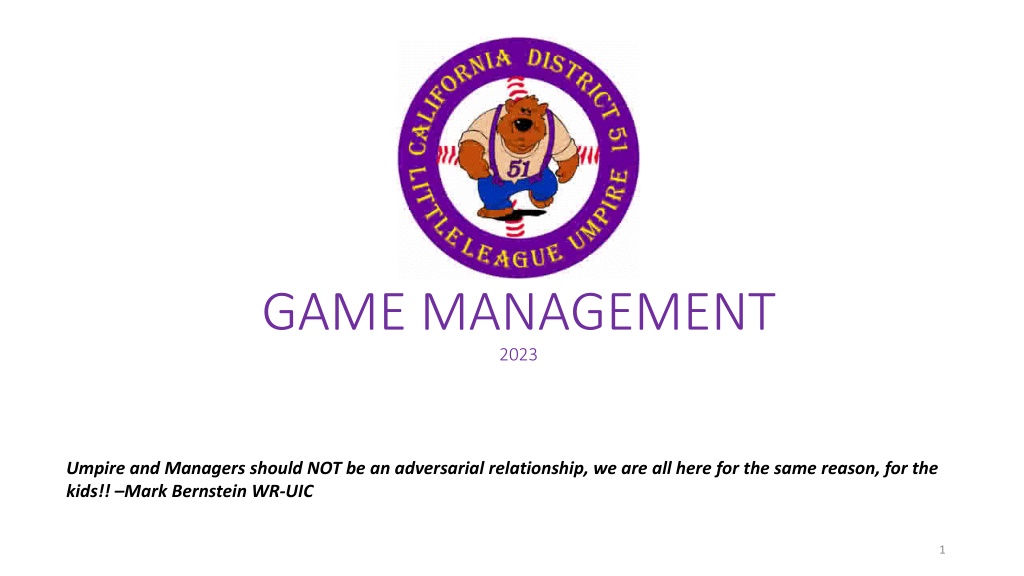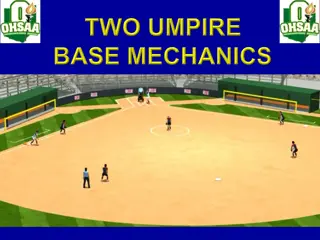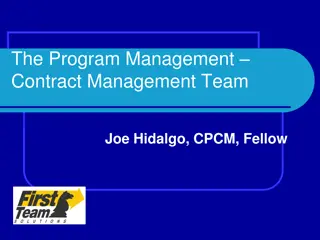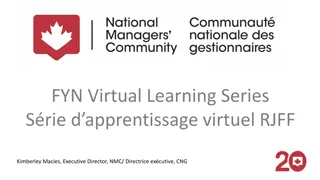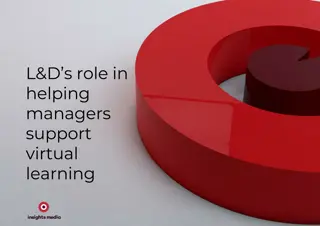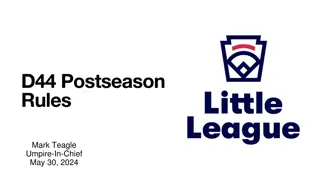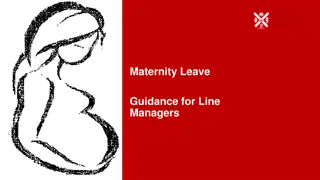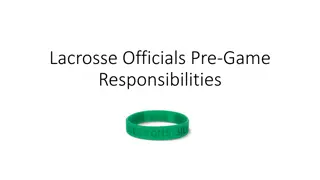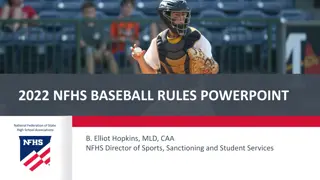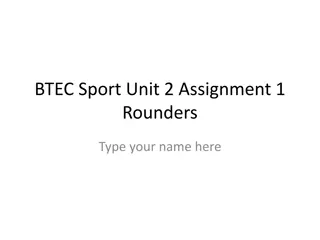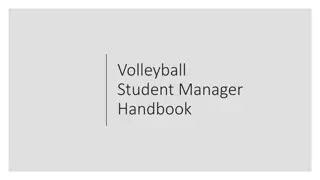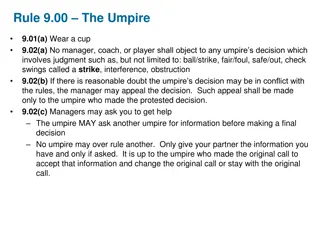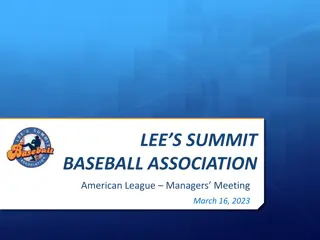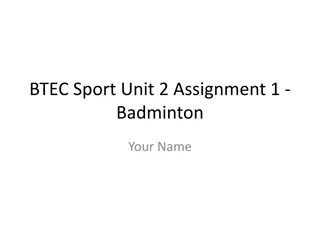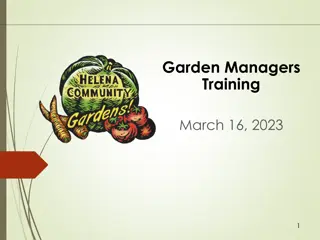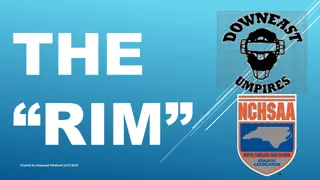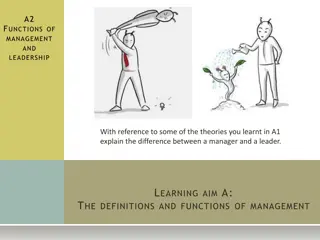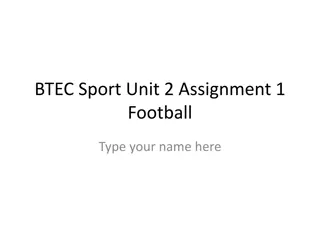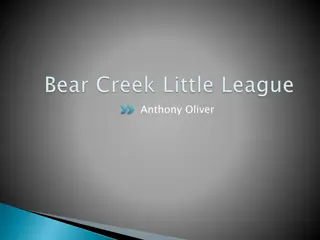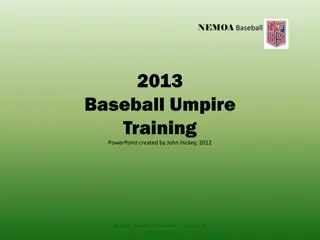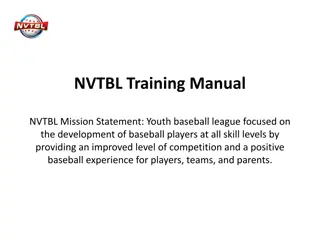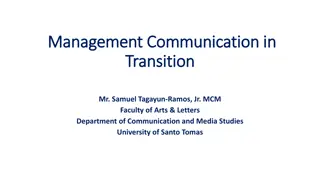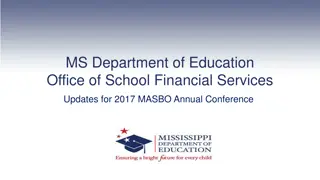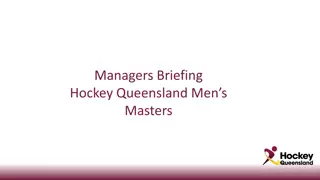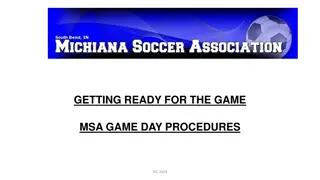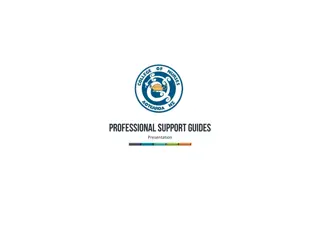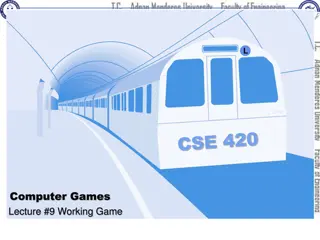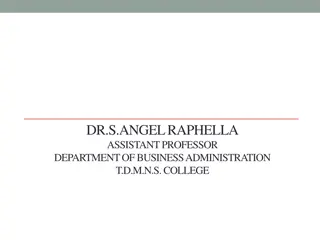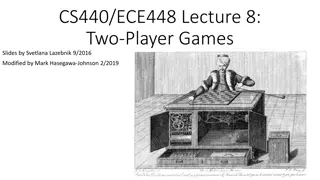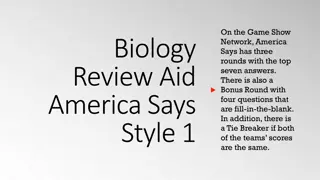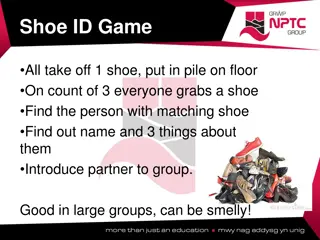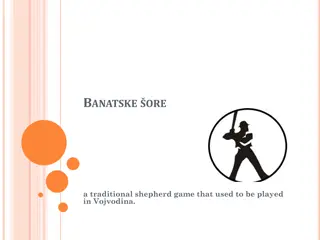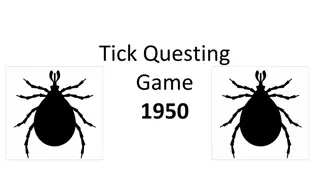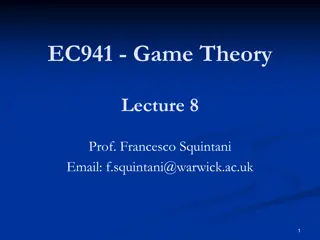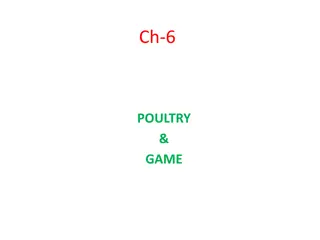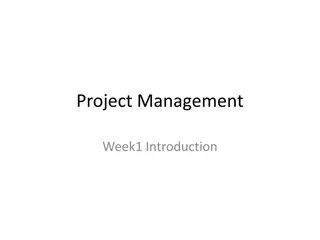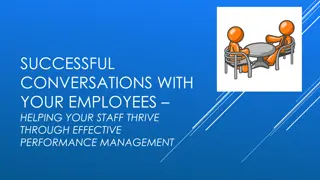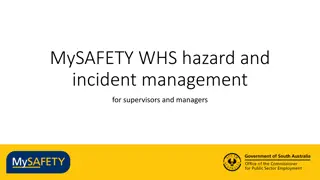Effective Game Management Tips for Umpires and Managers
Establishing a positive relationship between umpires and managers is crucial in youth sports for the benefit of the children involved. Key points include being role models, maintaining control without being authoritative, focusing on body language communication, and emphasizing the importance of listening and effective communication. These tips aim to create a harmonious and respectful environment on the field, prioritizing the well-being and development of young athletes.
Download Presentation

Please find below an Image/Link to download the presentation.
The content on the website is provided AS IS for your information and personal use only. It may not be sold, licensed, or shared on other websites without obtaining consent from the author. Download presentation by click this link. If you encounter any issues during the download, it is possible that the publisher has removed the file from their server.
E N D
Presentation Transcript
GAME MANAGEMENT 2023 Umpire and Managers should NOT be an adversarial relationship, we are all here for the same reason, for the kids!! Mark Bernstein WR-UIC 1
"The only purpose for adults in this game is to be role models for the children. If you cease to be a role model, your presence will no longer be required!" -- Phil Lamneck, Little League Florida District 13 Umpire Consultant 2
Game Management Tips (Umpiring is) the only occupation where you have to be perfect the first day on the job, and then improve over the years. --Ed Runge MLB Umpire Game Management as a state of mind Be in control of the game, NOT in charge! Mark Bernstein WR-UIC The perception of the umpire is the key to verbal and non-verbal communication Perception becomes reality! Don t hang out by one teams dugout Check ego body language stay calm, explain but don t argue Listen to coach, don t interrupt, move on when repeating Tell your umpires to NOT talk. If they are talking, they are not listening. The managers job is to represent their players/team. You never know, they may have a point, but you will not realize that if you are not listening. They need to let the managers do their job. Best definition I ever heard of game management is: "Having the ability to keep your head when all those around you are losing their heads and blaming you!" 3
Game Management Tips (cont.) 1) Body Language during contact with coach a) Make eye contact b) Hands at side or clasped behind back NEVER TOUCH A MANAGER/COACH c) Body turned slightly away from center d) Head turned to present an ear for listening e) If confronted face on, rotate slightly to turn the confronter f) Meet halfway if possible g) Use a nod of the head to convey agreement or understanding as the conversation is ended, this acknowledges the coaches right to be there h) Stay still until the conversation is ended, then move with a purpose to the next calling position 2) Body Language on field a) Always stand or position yourself with the expectation you are being watched, hands at sides or behind back b) Look happy to be there, facial expressions are the first form of communication we all see when meeting someone c) Hustle, walk with a purpose d) Be in the right spot, mechanics, mechanics, mechanics! 4
Game Management Tips (cont.) 3) Verbal Language a) Respond to questions only when asked, not statements b) Ask what the coach would like to discuss if they are not clear, Repeat back their concern c) When more elements of a play are needed, let the coach know we will get together and see if we have something else to add to the play, please return to the dugout while we get together. d) If a call is reversed, let the opposing coach know first if he/she is hovering out of the dugout, using rule book verbiage, then announce the call and place runners accordingly e) Agree with parts of statements when possible, IE Yes, that was a close play, the tag was on before contact with the base instead of the tag was good f) Use rule book verbiage, IE Runner hindered fielders ability to play a batted ball , not He got in the way g) Emphasize the need to continue play after the coach has spoken, use 20 second rule or when they repeat themselves h) Agree to watch for certain actions, IE illegal pitch, let them know we will be watching all players for any infractions of rules i) Let the talker have the last word 5
Game Management Tips (cont.) 4) Timing, the game a) Contact your partner the day before if possible, determine jersey color, discuss any parking issues, arrival time, team tendencies b) Arrive at the game site early enough to have credible responsibility, usually 45 min before scheduled start time, more if traveling c) Let BOD know you are present d) Pregame with partner: Discuss points of emphasis for that days assignment, IE I will be working on timing and positioning at the plate on passed balls , fly/fair/foul ball responsibilities, rundown, tag and first to third coverage, signals d) Enter the field as a crew f) Do not talk to any coaches at this point unless you see a rule violation such as no catcher s mask on a fielder next to a bat. In that case, just remind the coach the player needs a mask and move on. g) Check equipment when the team is on the field warming up if possible h) Walk over to coaches to invite them to the plate, do not holler at them across the field 6
Game Management Tips (cont.) i) Plate meeting: 1) Introduce yourself and partners, listen and remember coaches names 2) Exchange lineups, verify they are proper, names, position numbers, player numbers, proper number of substitutes, make sure coaches names are on the lineup, write them on if not 3) Ask if players are properly equipped, get a verbal yes answer from both coaches 4) Go over any ground rules specific to that field, if any 5) Remind them to play with good sportsmanship 6) Announce let s play ball 7) This should take about a minute/minute and a half 8) The players are in the dugouts, not on the field warming up 7
Game Management Tips (cont.) j) Administer the game k) Postgame 1) Use approved mechanics, be precise and crisp and hustle 2) Look and listen during the game, especially between innings 3) Be respectful of all players and coaches 4) Be direct when making calls 5) Be approachable at all times 1) Leave the field expediently, 2) Observe but do not respond to any parting verbal shots 3) Read through any game notes with partners, discuss any plays and determine if there was a better way to handle it. 4) Look up any rules in question 5) Prepare your equipment for the next use, dust shoes, wipe off shin guards, etc. 6) Make notes for the next games points of emphasis 7) Bring unique or questionable plays to the attention of the group for discussion 8) Thank your partners for working with you 8
You are in control of the game, dont forget that, but dont let it go to your head. An umpire watches and tells everybody what just happened It is not the umpire s job to be fair . An umpire s job is to make sure the game is played properly by the rules so that neither team gains an advantage not intended by the rules. Keep the game moving: encourage coaches to get the catcher out there. Limit warm-ups to 8 pitches in the first inning and 5 after that remember 1 minute between innings. Strikes and Outs Keep the game moving Think strikes behind the plate: everything is a strike until it proves itself to be a ball. Develop a consistent strike zone and stick with it through the whole game. Get set early and put your head in the same place in the slot Make sure you can see the whole strike zone Watch the pitch all the way in to the catcher s mitt but don t move your head If it s a hittable pitch, it s most likely a strike. (Don t think like a coach here) If it s waist-high and a little outside, call that one a strike. If it s high AND a little outside, it s a ball. If it s low AND a little outside, it s a ball. Call those strikes on inside corner the inside is part of the plate too 9
You will be judged by the obvious: Ball & Strike, Safe & Out. Take your time and get those right. Be confident: if you pay attention during training and read your rulebook at least twice cover-to-cover, you will know the rules better than anyone else at the game, and you will have no trouble showing it. Expect the unexpected. The younger the kids, the weirder the plays. Stay focused and stay alert: sometimes that can be hard when it s 98 degrees, and neither pitcher can find the strike zone on a map Let the ball take you to the play don t assume a throw will be made and turn away Get in proper position: angle over distance Hustle: try to be stopped when the play happens Pause, Read, React: Take your time and think about what you just saw, pause, and make the call loud and clear. Loud & Proud: tell everyone you know you got that call right. Get it Right: Don t argue with coaches, but do discuss if needed. Confer with your partner if needed to get it right Understand that umpires will make mistakes. Don t try to make up for a bad call. Let it go. Call what you see on the next one. NO MAKE-UP CALLS!!! 10
This is a commitment: be prompt and professional start on time Make sure you get an appropriate replacement if needed If you look professional, you ll be treated that way; wear a neat and clean uniform/hat Don t chat with your friends between innings keep the game moving Stay safe Wear your gear properly Wear your cap tight and your mask loose hang the mask off the brim of your cap Plate umpires MUST wear a chest protector, shin guards, (shin guards optional for softball, but I wouldn't do a game without them) and males MUST wear a cup . always! (9.01a) Wear proper shoes On hot days make sure to drink plenty of fluids before and during the game (prep really begins the day before) No matter what call you make, 50% of the people think you blew it. Don t listen to the crowd. 11
Hints to handle managers (or when to dump them?): 1) Follow the 3 Ps Personal , Prolonged, Profane (magic word?) 2) A - Take a breath B Listen C Watch body position D Don t reply to statements E What s your question/Ask if they have a question F Answer the question with a Yes/no Yes (no) there was (wasn t) a tag 3) Use the Quiet toss vs the heave-ho 4) The escalation and handling of the chirping from dugout. Start with "the look", then "that's enough" with mask on or off, then the meeting halfway (if possible). Don't go to their office, the discussion takes place halfway if possible or if need be in our office. The idea of the doing it so that the manager left us no choice when we eject. Simply, calmly, saying it's time for you to go now. 5) immediately after the ejection walk away, let partner take over if you have one and they are capable. 6) paperwork after the game, some leagues/umpires have not been doing the report to the president. send to district if an inter-league game. 7) BOD/TD handle spectators if need be 12
Top 10 Advice List For New Blues - by Mario Fiermonte Always watch the BALL, and you will likely not miss an important play. Never SEARCH for rules violations Don't let inane comments bother you. Parents and coaches will usually say things like "that looked close" and the like, but they are not meant to undermine your authority. Save your 'authority' for prevention of direct, mean spirited, or repeatedly disruptive personal attacks. Read your rulebook regularly. Rereading it will cause you to see things you missed the first time Never hover around a particular dugout, or mingle too closely with players and spectators, as this will cause problems. You don t want it to look like you favor one team or the other. ALWAYS back up your partner. Let HIM/HER decide if he wants to make your input you can t change his/her call Let coaches know how you feel about certain types of behavior before the game begins but don't be an anal-retentive jerk. Treat them with courtesy, and they will hopefully make at least a feeble attempt to treat you the same way. NEVER get into a shouting match with a spectator. Always make calls with clear, firm decisiveness, and confidence. Dress appropriately, look sharp, have the right equipment. To do otherwise undermines everything you represent. 13
Reg III, (d)2. Note 3 Concussion Protocol Concussion Protocol All States/Provinces Have Programs to Protect Youth CDC Provides Training and Guidance CA Requirements: Adolescent Health (CHSC 124235) Upon Suspicion of Concussion - Player Removed from Any Activity Immediately - Required Medical Evaluation/Return to Play Protocol Met - Mandatory Notification of Parents Annually - Awareness Information Provided to Players/Parents - Every Coach or Administrator Must Complete Training
Reg III, (d)2. Note 3 Concussion Protocol Concussion Protocol Training and Guidance (https://headsup.cdc.gov) Multimedia Presentation Answering Certification Need Resource Center with Additional Data Evaluation Material Throughout - Pre-Test to Evaluate Initial Understanding - Progress Checks - Final Examination to Validate Course Completion and Certification Recommend keeping both the full page and the wallet- sized versions available throughout the year
Reg III, (d)2. Note 3 Concussion Protocol Concussion Protocol Training and Guidance (https://headsup.cdc.gov) Multimedia Presentation Answering Certification Need Resource Center with Additional Data Evaluation Material Throughout - Pre-Test to Evaluate Initial Understanding - Progress Checks - Final Examination to Validate Course Completion and Certification Recommend keeping both the full page and the wallet- sized versions available throughout the year
Sudden Cardiac Arrest Training Sudden Cardiac Arrest Training California law requires all K-12 schools in the state to educate coaches, parents/guardians and student athletes about sudden cardiac arrest. SCA occurs when the heart suddenly stops beating typically due to arrhythmia. It is also a leading cause of death for student athletes and often fatal if not treated within minutes. One site (one I used) Eric Paredes Save A Life Foundation Teen Cardiac Screenings (epsavealife.org)
California AB 506: Child Abuse Training AB 506 requires all youth organizations in California to collect Live Scan background checks and certificates of Mandated Reporter training, effective Jan. 1, 2022. Assembly Bill 506 was passed by the State of California in September 2021, requiring volunteers and staff of youth service organizations to complete training in child abuse and neglect reporting, All employees, administrators (including board members), and regular volunteers must complete a Live Scan background check (the digital version of inked fingerprinting), and complete online Mandated Reporter Training (known as MRT). Both of these are one-time requirements as long as you remain in the same BSA council. California State Mandated Reporter Training for Volunteers is the 2-hour online training provided by the Office of Child Abuse Prevention in the State Department of Social Services at this link: https://mandatedreporterca.com/training/volunteers.
